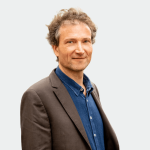[FR] Building barriers and rebuilding society
Newsletter elections

By placing the far right in the second round of the presidential election once again, French voters are giving the choice on 24 April a gravity which, while unfortunately no longer exceptional, is nonetheless most palpable this time around. The whole of Europe understands this and will be watching closely that evening to see the verdict of the French polls. During the first-round campaign, on France 2, our President Enrico Letta was Marine Le Pen’s opponent. He was able to unmask her anti-European and crudely Putinist political agenda. Today, he is calling for her to be defeated in the name of Europe and for France, by supporting the outgoing president’s resolute European ambition. Given the historic stakes, abstention is not an option. However disappointed some may be with the past five years, we cannot shirk our civic responsibilities for the future, which would be jeopardised by the far right coming to power. We must actively oppose it and not wash our hands of it.
The contest promises to be close. Even if the margin is wider than the latest polls suggest, Emmanuel Macron’s uncertain victory will be hard-fought. It will have the bitter taste of a battle won on a demobilised electoral field, reflecting a fractured society and a divided nation. The results of the first round highlight deep territorial and generational divisions. The already high abstention rate in the first round, as in the last presidential election, and the widespread attraction to radical and disruptive positions express a widely commented mistrust of the governing parties in particular and political power in general, which are considered to be failing and/or powerless. Exacerbated individualism and identity-based communitarianism have seriously eroded the foundations of representative democracy, at the risk of a future trial of illegitimacy in the streets.
In these tense conditions, being President of all French people has never seemed as impossible a task as it is urgent. The aftermath of 24 April is pressing. We must take candidate Macron at his word on his democratic promise of a new mode of government and planning. And we must reread Delors*, who, after the narrowly won Maastricht referendum revealed similar fault lines, defined three roles for a state serving the nation: that of guardian of security, that of facilitator of economic and social development, and that of unifier.
The first role, the most sovereign, is the most expected, but not the easiest to exercise fairly across the diversity of the territory. The second is closely linked to planning, which Delors does not reduce to a ministry organising forward-looking work by experts, but sees as a crossroads where the aspirations of intellectuals, employers, trade unions, senior civil servants and all stakeholders are expressed. He situates this plan ‘in the interstices of power and society,’ where it becomes a ‘national box of ideas.’
The ‘unifying state’ has the broader responsibility of ‘the formidable mission of maintaining national identity and stimulating the desire to live together.’ It must restore meaning to collective life and nurture social bonds. The ‘unifying state’ rehabilitates intermediary bodies as mediators between citizens and political power, which the presidential institution of the Fifth Republic tends to overshadow. As a counterpoint to vertical decision-making, it leaves room in public policy for dialogue and initiatives, encouraging engaged citizenship in response to unfulfilled desires for recognition and feelings of contempt or relegation. Recent experiences of participatory democracy should find fertile ground. The challenge for the next five years will be to bring together opposing forces that are willing to work together. The challenge is not necessarily just to move beyond the left and the right, but more fundamentally, according to a definition of democracy dear to Delors, “to move beyond the citizen through his or her own participation in the collective endeavour .” And this participation, this transcendence, begins on 24 April.
*Jacques Delors, L’unité d’un homme – entretiens avec Dominique Wolton (The Unity of a Man – Interviews with Dominique Wolton), published by Odile Jacob, 1994




